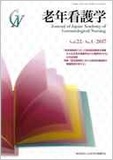Japanese
English
- 販売していません
- Abstract 文献概要
- 参考文献 Reference
抄録
【目的】本研究では,病床機能別に摂食嚥下障害を有する高齢者への支援体制として,専門職の配置,対応を把握するとともに,これらと研修ニーズとの関係を検討することを目的とした.
【方法】8,270病院の看護管理者宛てに郵送法による無記名自記式質問紙調査を行った.調査期間は2014年2〜3月であった.分析は病床機能別に,摂食嚥下障害に対し専門的対応が可能な職種,摂食・嚥下障害看護認定看護師,摂食嚥下障害患者への体制・対応,ならびにこれらと摂食嚥下障害患者への誤嚥予防のための研修ニーズとの関係をχ2検定で検討した.本研究は横浜市立大学倫理審査委員会の承認を受け実施した.
【結果】回収数は合計510件で分析データ数は473件(92.7%)であった.病床機能と摂食嚥下障害患者への体制・対応について「評価できる施設内の専門家」「ケア対応できる施設内の専門家」「胃ろう・経管栄養者の受け入れが積極的」「NST(栄養支援チーム)」「摂食・嚥下を支援するチーム」「VF(ビデオ嚥下造影)による評価」で有意差がみられた(p<0.05).研修ニーズの有無を病床機能別にみると,全体では「摂食・嚥下障害看護認定看護師がいない」「胃ろう・経管栄養者の受け入れが積極的である」,一般病床では対応可能な専門職として「医師,社会福祉士がいない」,医療療養病床では「相談できる施設外の専門家がいない」で,有意に研修を希望していた(p<0.05).
【考察】病院における摂食嚥下障害に対する支援はいまだ十分とはいえず,研修ニーズも高いことから教育提供の充実を図ることが重要である.
[Purpose] The purposes of this research were to grasp the arrangement of professionals, the structure and management of each ward in hospitals by its functional type, and to verify their relationship with training needs.
[Methods] Anonymous self-registered self-return questionnaires were sent to nursing administrators at 8,270 hospitals. The investigation period was from February to March 2014. Responses were analyzed according to the functional type of the ward, using χ2-test on occupational categories capable of specialized approach regarding dysphagia, certified nurses for dysphagic care, the system and measures to cope with dysphagic patients, and the relationship between these with the request for training focused on prevention of aspiration by patients with dysphagia. This study was conducted with the approval of the ethical review board at Yokohama City University.
[Results] The total number of responses was 510, and of them, 473 (92.7%) were analyzed. Regarding the functional type of wards and the system/care for dysphagic patients, there were significant differences in the items, “experts in hospital capable of evaluation,” “experts in hospital capable of dysphagic care,” “actively accepting patients with gastrostomy/feeding tubes,” “NST (nutrition support team),” “existence of support team for dysphagia,” and “evaluation by VF.” (p<0.05)
Additionally, whether or not there was a need for training was examined according to the functional type of the wards. It was found that there were significant differences in the items, “there are no certified nurses in hospital” and “not actively accepting patients with gastrostomy/feeding tubes” as a whole; and “there are no doctors or social workers who can handle dysphagic care in hospital” in general wards and “there are no experts outside the hospital to consult with” in the medical care wards.
[Conclusion] The support system for dysphagia in hospitals has not yet reached a satisfactory level, and there is a strong need for training. Thus, it is important to enhance the provision of education.
Copyright © 2017, Japan Academy of Gerontological Nursing All rights reserved.


